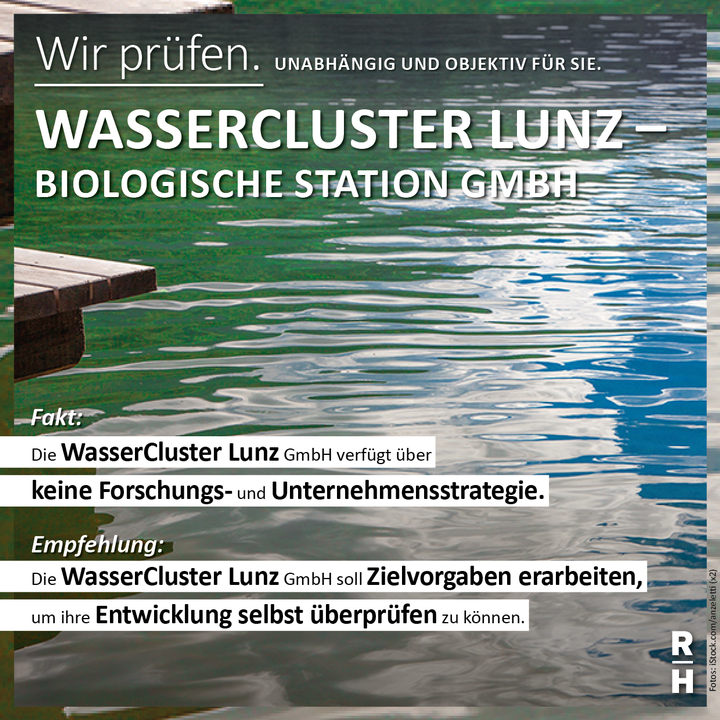The ACA points to a lack of strategy at the WasserCluster Lunz GmbH

In its report published today, the Austrian Court of Audit (ACA) presents the audit of the WasserCluster Lunz GmbH (WCL), a non-university research institute in Lower Austria. Therein, it detected legal ambiguities in the area of human resources, and recommends to develop a strategy for the organization as a whole. In the course of the audit, the ACA also detected a case of double funding in the framework of the COVID-19 short-time work scheme. This was corrected by the WCL in a short period of time.
The WCL is owned by the University for Continuing Education Krems (Danube University Krems), the University of Vienna and the University of Natural Resources and Life Sciences Vienna. Since 2005 it has been carrying out research in the field of riverine landscape ecosystems. Despite the long-standing research activities, WCL had neither a research nor a business strategy in place at the time of the audit. The ACA notes that this also resulted in a lack of targets that would enable the WCL to assess its work.
No supply of staff
In the course of its audit of the years 2016 to 2020, the ACA pointed to deficiencies in the area of human resources. The heads of four of the six working groups, for example, were employed by the universities that held a share in the WCL. However, those universities had not concluded any corresponding labour supply agreements with WCL. The WCL was, for example, not able to issue instructions to those staff members. The concerned heads, in turn, did not have the right to issue instructions to their working groups. As regards the filling of vacant managerial positions, the ACA furthermore recommends to publicly advertise the vacancies in the future.
From the ACA’s viewpoint, there was also room for improvement as regards another interface to a university that held shares in WCL: for various administrative tasks, WCL turned to the corresponding units of the Danube University Krems. For this purpose, it paid an annual lump sum of EUR 25,000. For this amount the ACA, however, did not find a corresponding basis and therefore recommends to calculate the actually necessary amount as accurately as possible.
More transparency and plausibility needed
Another issue concerns the general working methods and their documentation. In 2020 alone, WCL carried out 32 projects with a total funding amount of EUR 1.1 million. It, however, had no overall overview of all those activities. Furthermore, it had no written guidelines for work processes and the management of projects. This resulted in a lack of plausibility and transparency.
Double funding through COVID-19 short-time work allowances
In the second quarter of 2020, WCL received a funding by the Austrian Science Fund (Fonds zur Förderung der wissenschaftlichen Forschung) as well as COVID-19 short-time work allowances for four staff members. From the viewpoint of the ACA, this represented an inadmissible double funding amounting to some EUR 30,000. After being informed of this, the Austrian Science Fund demanded the return of the overpaid funds, and WCL complied with this demand within a very short time.
The ACA positively highlights the WCL’s efforts to promote women in research. As regards the future, it also sees an opportunity for WCL to make a substantive contribution in the context of the 2030 Agenda. In this Agenda, the United Nations set out the Sustainable Development Goals (SDGs), to which Austria has also committed itself. Some of the research activities carried out by WCL tie in with the SDGs. The ACA recommends to evaluate the contributions to the goals of the 2030 Agenda in the research projects and to publish them in the annual reports. This could help to strengthen the citizens’ awareness of the SDGs.
Random sample audit
The WasserCluster Lunz GmbH was randomly selected as an audit topic. The ACA carries out such sample audits in order to take into account institutions that would otherwise, due to their size, not be a focus of its audit work.
- pdf Datei:
- 1,941.0 KB
- Umfang:
- 64 Seiten
Report: WasserCluster Lunz - Biologische Station GmbH (in German)
In February and March 2021, the ACA audited the WasserCluster Lunz – Biologische Station GmbH in Lower Austria in the framework of a sample audit. The audit aimed at assessing the governance and modus operandi, the strategy, the economic situation, the human resources management and the internal control system of the company. The audited period essentially spanned the years from 2016 through 2020.


